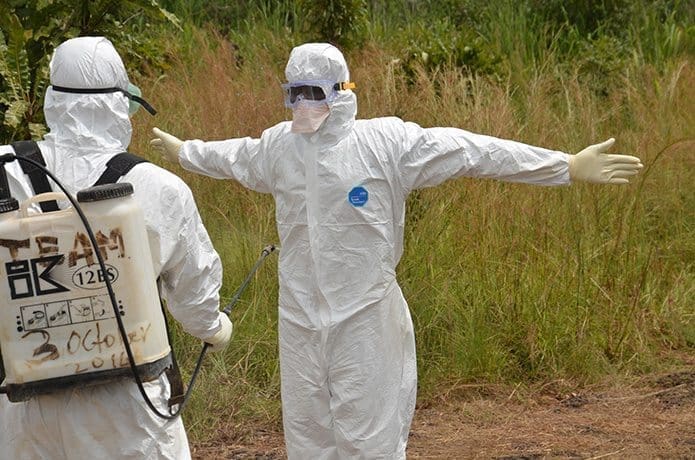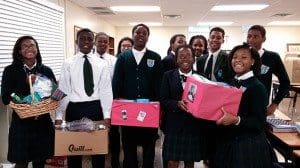 CNS photo/Michael Stulman, courtesy Catholic Relief Services
CNS photo/Michael Stulman, courtesy Catholic Relief Services Lithonia
Christ Our Hope parishioners send Ebola aid to native Sierra Leone
By NICHOLE GOLDEN, Staff Writer | Published November 13, 2014
LITHONIA—With family members in Sierra Leone, several men at Christ Our Hope Church are deeply concerned and sending needed supplies as the number of Ebola cases continues to rise in the West African nation.
By Nov. 5, the World Health Organization had attributed 1,070 deaths to the virus in Sierra Leone, with more than 4,759 cases confirmed since the outbreak began in May.
Ebola is now present throughout the country and weekly counts show cases are increasing.
Sierra Leone native Michael George, a member of the Lithonia church, has siblings and two daughters living in Sierra Leone.
“I can’t sleep,” said George.
One of his daughters is a college student and the other a nurse. “They have to stay home” because of the danger of contracting the disease, said George.
Dr. Augustin “Gus” Smith, who also attends Christ Our Hope, has lived in the United States for 19 years and is a physics professor at Morehouse College in Atlanta.
“Ebola was something we heard about … read about,” said Smith.
When he was growing up in Sierra Leone, there was an efficient Catholic hospital.
“I grew up in that environment,” he said. “We had some health care infrastructure.”
But changing governments and civil strife between 1991 and 2002 impacted health care and its delivery.
“The war contributed to the dismantling of these structures,” explained Smith.
The country was rebuilding in the years following the war, and the future seemed brighter.
It was bad timing for a crisis, as Sierra Leone was not prepared for an Ebola outbreak to spread from neighboring nations of Liberia and Guinea.
“We’ve had our share of bad luck. It’s not just one single thing,” said Smith.
Both George and Smith say there’s not good education about transmission of the virus, with some people doubting the information outsiders provide and foreign aid, or even that the virus exists.
The Ebola virus causes hemorrhagic fever and is contracted by contact with blood or bodily fluids of patients.
People in quarantine are often not receiving any food, and some patients with other health problems are contracting Ebola while at the designated treatment centers. Other patients exhibiting symptoms sneak off to satellite clinics out of fear of catching Ebola. There are not enough physicians to treat other illnesses such as malaria or even complications from pregnancies.
Foreign companies are leaving Sierra Leone, and schools and colleges are closed.
‘Moral obligation’ to step up
To try and respond, the men are working with the Georgia chapter of the Tegloma Federation to obtain and ship needed medical supplies.
“At the onset, we were called by the Tegloma Federation,” said George.

Eighth-grade students at St. Peter Claver Regional School in Decatur collected hygiene-related items in October to be distributed in Sierra Leone where residents are dealing daily with the Ebola virus and limiting exposure to it. Eighth-grade teacher Brenda Cheewah coordinated the project with Michael George of Christ Our Hope Church, president of the Sierra Leone community in Atlanta.
The federation, whose name means “progress,” is a Sierra Leonean charitable organization working with its member chapters nationwide to raise funds to send medical supplies and gear to Ebola centers.
“We are both members of the local chapter,” said Smith.
“One of our team members lost 12 members of her family,” he added about the toll of Ebola.
The Tegloma Georgia chapter raised funds to ship by air to Sierra Leone needed gloves, gowns, protective shoe covers, gauze and goggles.
“Nobody knew how to deal with this,” said Smith.
Both men are supporting family members in Sierra Leone financially and supplying food staples so that relatives don’t have to venture far from home.
Smith thought about going back to help in some way at the beginning of the outbreak. George tries to travel to Sierra Leone every two years but also decided that is not possible at this time.
“We want to really step up. We have that moral obligation,” said George.
Tegloma Georgia hopes to make connections with medical personnel and collect more funds and items to aid with infection control.
“We can be more effective,” said Smith.
Smith has been communicating with a brother who works in a Sierra Leonean government department dealing with nutrition.
“They’re very worried,” he said.
Smith, who initially returned to Sierra Leone after studies at Oregon State University, ultimately immigrated to the United States. He and his wife had two small boys at the time.
“You can’t teach physics in a developing nation,” said Smith.
George is completing his thesis for legal studies and recently started an internship at a county solicitor’s office in metro Atlanta.
Both men ask the question “Why?” in regard to the suffering in their native country, so rich in natural resources and with good schools.
Of the 6 million people living in Sierra Leone, they estimate that 20 percent are Catholic and another 20 percent are members of other Christian denominations.
The men are grateful for support coming from other groups, including the students at St. Peter Claver Regional School in Decatur and fellow Christ Our Hope parishioner Victor Mbaba, who is the executive director of a nonprofit called Africa’s Children’s Fund.
St. Peter Claver students, led by teacher Brenda Cheewah, collected supplies such as hand sanitizers, cotton balls, gloves and hydrogen peroxide.
“St. Peter Claver students come from all over the world, so for us, this effort was an important way to remember we are one global community called to help each other,” said Meaghan Schroeder, director of admissions and development at St. Peter Claver.
Africa’s Children’s Fund, founded by Mbaba, contributed $2,000 to the group’s efforts.
“We have the umbrella,” said George, about the working partnership with the Tegloma Federation.
“People to people maybe we can solve these problems,” he said.
For information on Tegloma Georgia’s work to aid Sierra Leone’s people, email Michael George at mpgeorge63@gmail.com or Dr. Gus Smith at asmith926qe@gmail.com.